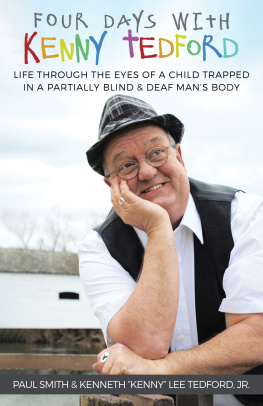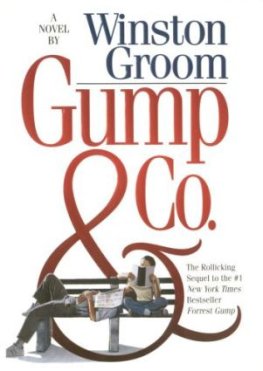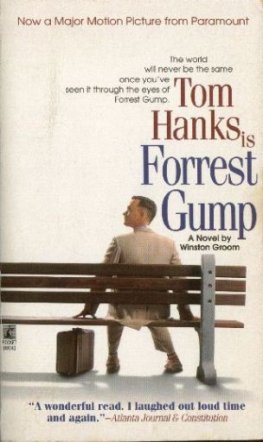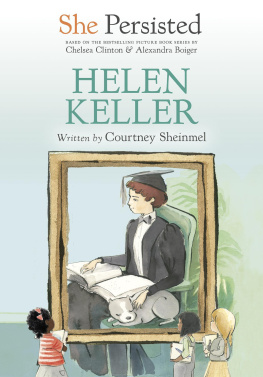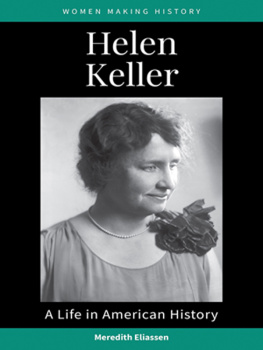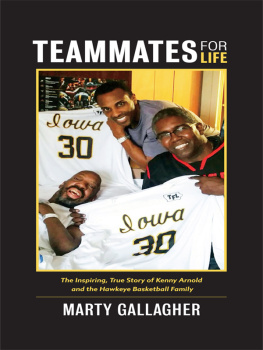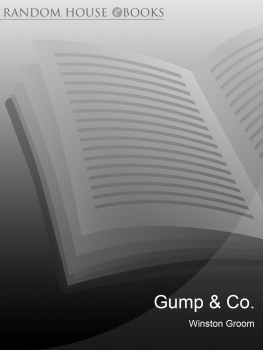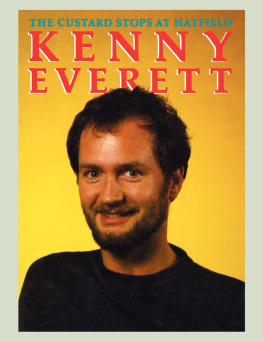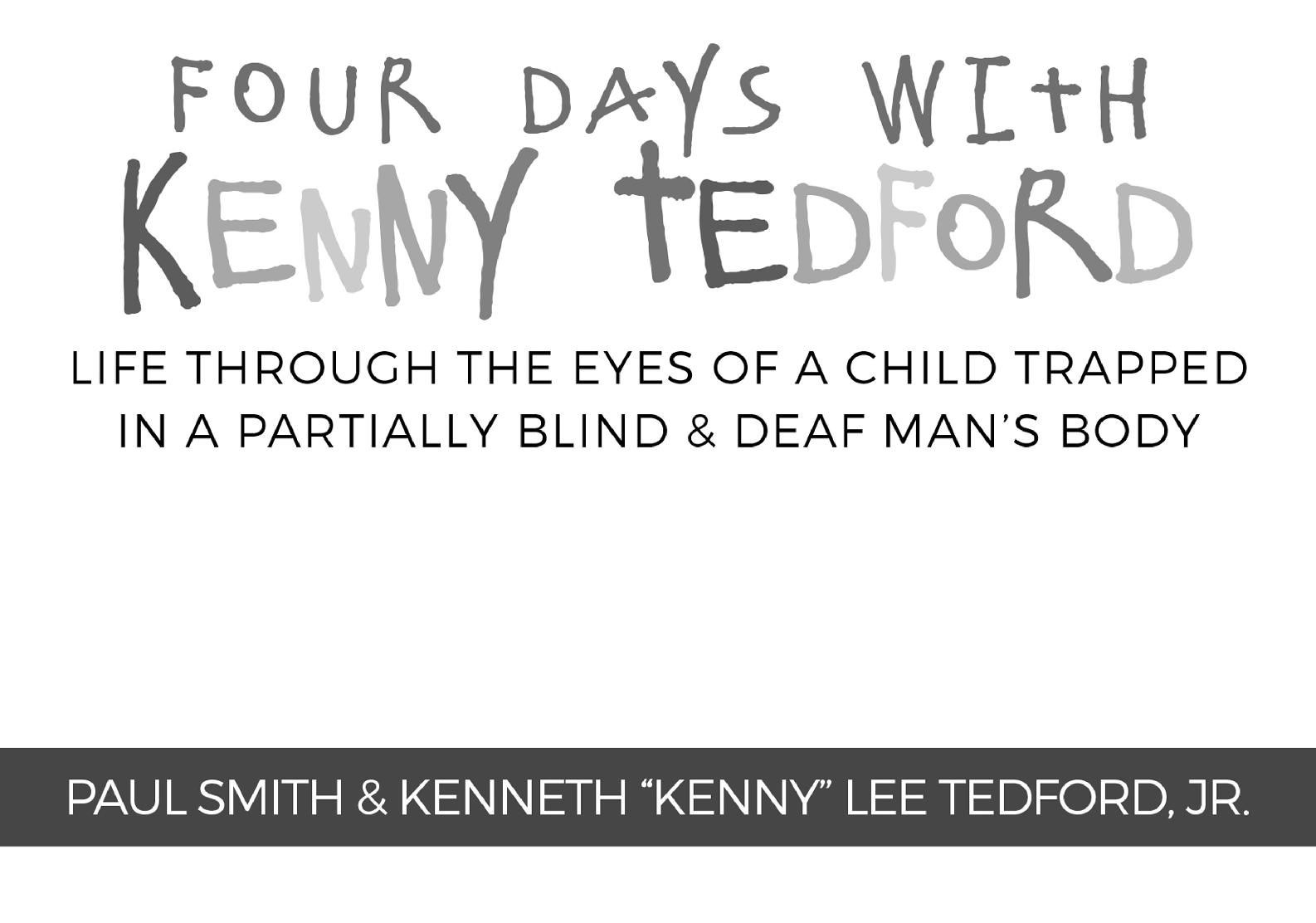

USA
Behler Publications
Four Days With Kenny Tedford
A Behler Publications Book
Copyright 2020 by Paul Smith
Cover design by Yvonne Parks - www.pearcreative.ca
Front cover photography by Sean F. L. Read
All rights reserved. No part of this book may be reproduced or transmitted in any form or by any means, electronic or mechanical, including photocopying, recording, or by any information storage and retrieval system, without the written permission of the publisher, except where permitted by law.
Some names have been changed to protect their privacy.
Library of Congress Cataloging-in-Publication Data
FIRST PRINTING
ISBN 13: 9781941887028
e-book ISBN 9781941887035
Published by Behler Publications, LLC, USA
www.behlerpublications.com
Manufactured in the United States of America
To my wife, Lisa,
for her unwavering love and support
as I follow my dreams.
~ Paul Smith
To my mom and dad,
for treating me like a son, not a disabled son.
And to disabled people everywhere.
I hope the story of my journey helps you with yours.
~ Kenny Lee Tedford, Jr.
Table of Contents
Acknowledgments
Wed first like to thank all the wonderful people in Kennys life who helped make him who he is today. Most of your names are already mentioned in the book, so we wont repeat them here. But you know who you are. Without you, there wouldnt be a story to tell.
Thanks to our editor at Behler Publications, Lynn Price, for seeing even more in this project than we did, and pushing us to make it happen. Thanks to our literary agent, Maryann Karinch, as well as Lisa Smith, Ben Smith, Jon Christiansen, and James Kevin for reviewing early manuscripts and providing wonderful guidance.
Wed also like to thank all the other people who contributed to the making of this book in some way, by contributing their time, talent, or even their home where we met for our interviews. That list includes David Greene, Judy Greene, Debbie Gregg, Joe Honeycutt, Valerie Menard, Carol and Paul Meyer, Jeff Meyer, Rita Needham, Sean Read, and Bryan and Danielle Upshaw.
Lastly, wed like to extend a special thank you to the National Storytelling Network and David Hutchens for inviting us both to speak at the National Storytelling Conference in 2012, where we first met. The rest, as they say, is history.
Meeting Kenny
I was sitting in the front row waiting for the next performance to start when I saw him. He was a large man. Sixty-ish. With grey hair encircling a bald head, and glasses thick enough to start a fire on a sunny day.
He walked slowly and deliberately, with a slight list to one side. He made his way down the aisle and sat in the chair next to me.
Following quickly behind him was a twenty-something man with dark hair. The young man pulled one of the empty chairs out of the row, turned it around backwards, placed it directly in front of the older man, and sat down with his back to the stage.
I was intrigued, to say the least.
A few minutes later, the next speaker walked on stage and started her performance. The young man, whod been staring at the older man, silent and motionless since sitting down, suddenly sprang into action. He lifted his hands in front of his chest and began a flurry of cryptic motions that identified him immediately as a sign language interpreter, and the older man as deaf.
I thought that was pretty ballsy, a deaf guy at a three-day storytelling festival.
I knew immediately I wanted to meet him. So at the next break, I introduced myself. We exchanged a few pleasantries, enough to know that he was an affable sort of guy. But we both had to go to our next set of workshops.
An hour later, I was walking with a tray of food, looking for an empty table, and that same affable fellow walked up to me and asked if I wanted to have lunch with him. I quickly accepted.
We sat at a table by ourselves, his interpreter having been given time off for lunch.
For the next hour, I listened to Kenny Tedford tell his story.
I listened while he spoke with impressive diction, but with the muted tones of a deaf person. And he read my lips, seemingly, as easily as I spoke with them.
But, underneath the telltale tone of his voice, I noticed something else telling. His vocabulary and sentence structure were both charmingly juvenile. As his story unfolded, I started to understand why. His deafness turned out to be only one of many challenges life dealt Kenny Tedford. He was almost blind in one eye, and had poor vision in the other, partially paralyzed on his left side, unable to speak well until the age of ten, and had somewhat limited cognitive abilities, all of which were a result of brain damage suffered at birth. And as if that werent enough, in the years since, hed endured a string of near-fatal illnesses that should have left him dead many times over.
Despite it all, the man sitting in front of me seemed to be the most delightful individual one could ever meet. His temperament and outlook on life and humanity were unquestionably positive in a way I can only describe as childlike. In fact, he struck me as a remarkable combination of Helen Keller and Forrest Gump. Keller, of course, was deaf, blind, and mute. But she was a brilliant thinker and accomplished writer. The fictional Forrest Gump, on the other hand, was a model of physical health once he shook off the leg braces. But he suffered a diminished mental capacity that gave him his childlike charm .
Kenny Tedford, however, had both sets of challenges.
So there I sat, watching this somewhat goofy-looking, old, bald, roly-poly man, smiling at me with enormously distorted bug eyes through his impossibly thick glasses, telling me almost unbelievable stories in the words of a child, but with the voice of a grown man, whod never properly heard the sound of his own voice.
I was mesmerized.
The hour ended way too quickly. Id only scratched the surface of Kennys life. But it was enough to be fascinated by what Id heard, and to be frustrated that I didnt know more.
I wondered how a man in his circumstances could have such a positive disposition. Why isnt he bitter at life for dealing him such a crappy hand, I wondered. I was pretty sure I would be.
I had so many questions. But it was time for the next session. My chance encounter was over. I didnt know if or when I would ever see or speak to Kenny Tedford again. But what I did know was that I felt strangely blessed having met him.
The following year turned out to be one of the most important turning points in my life, and unquestionably, the single most important in my work.
I was in my mid-forties and two decades into a successful, yet, uninspiring corporate career. I was a walking clich of the Decade of Greed that was the 1980s. Not quite Gordon Gekko, but perhaps his tamer, less ambitious younger brother: business undergraduate degree, two years as a consultant, Ivy League MBA from the same school that produced junk-bond billionaire Michael Milken and real-estate mogul turned President Donald Trump, followed by a constant march up the corporate ladder at a Fortune 50 company.
Dont get me wrong. I liked my job. But I was in a place that I think most people find themselves at work. They love a small part of their job, the part that made them choose that career to begin with. They hate a small part of their job, office politics or filling out their expense report. And, in the middle, is the large swath of responsibilities they like well enough, but nothing theyd do without getting paid for. Not bad work, in other words, just nothing that makes you jump out of bed in the morning.
Next page
